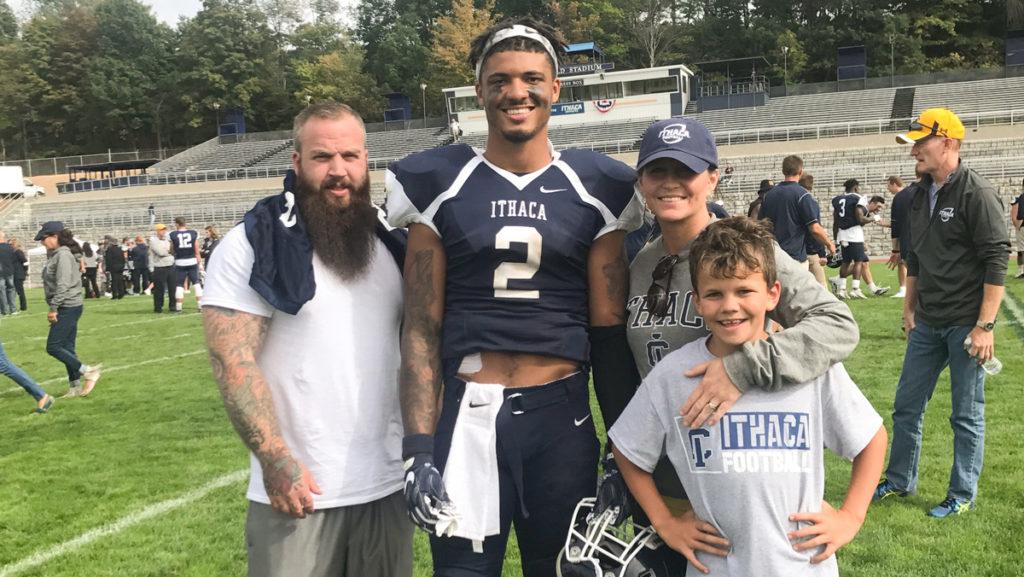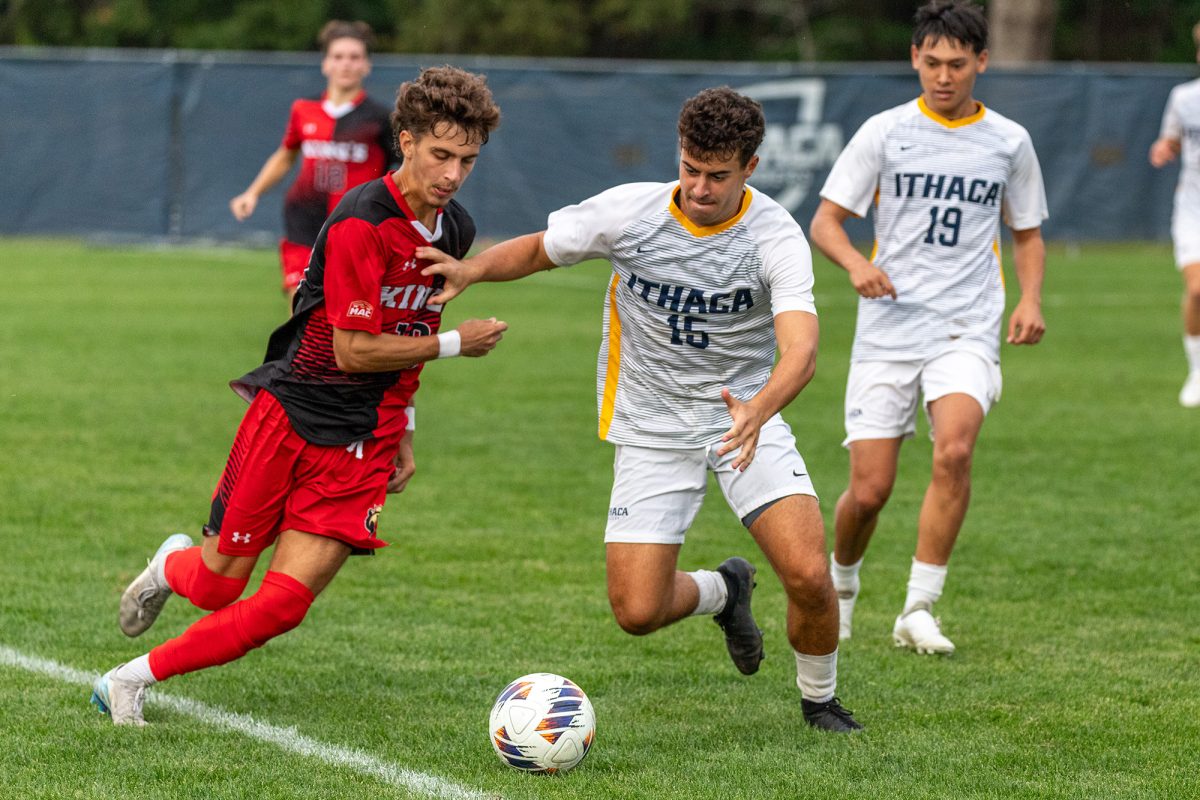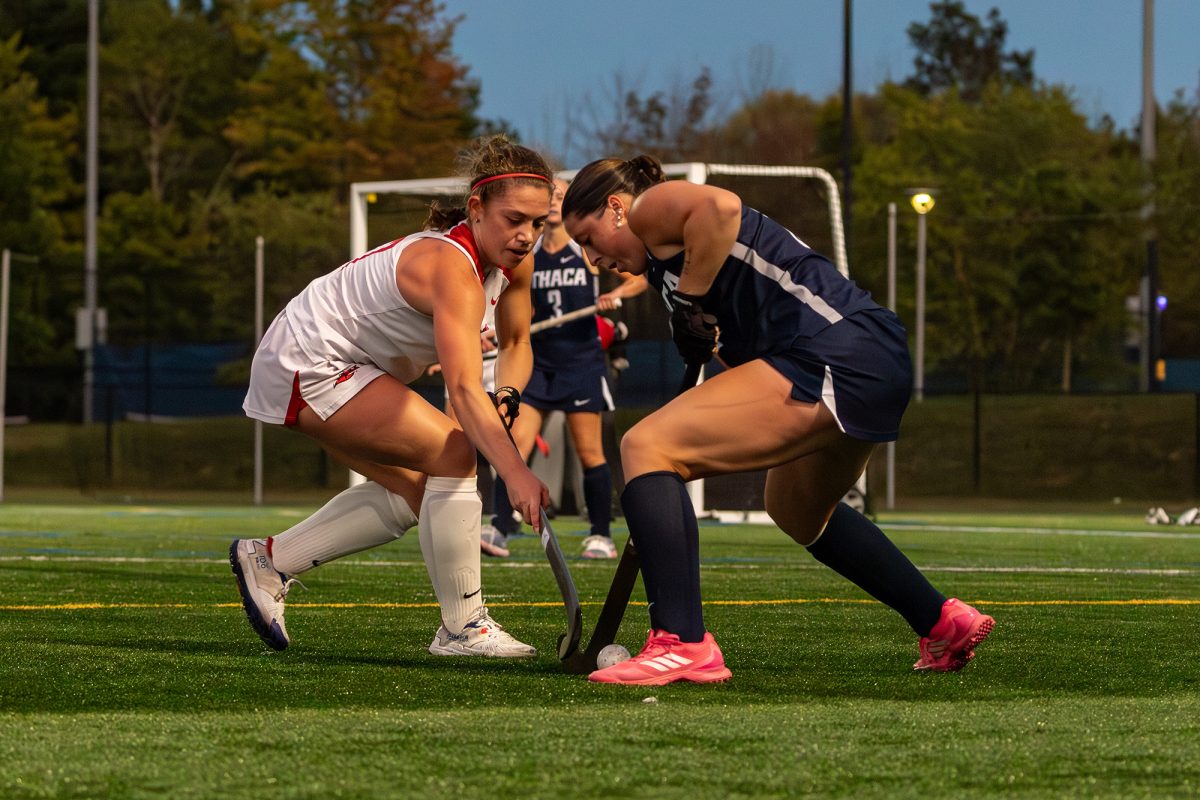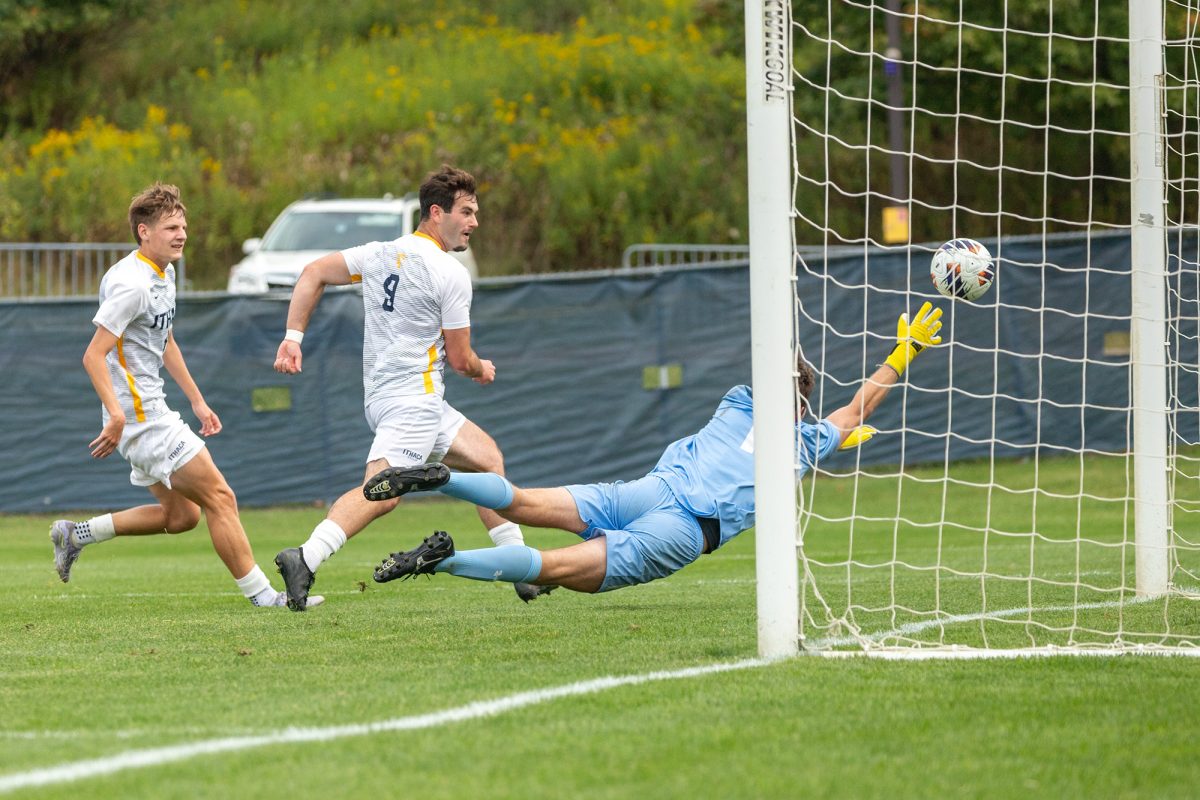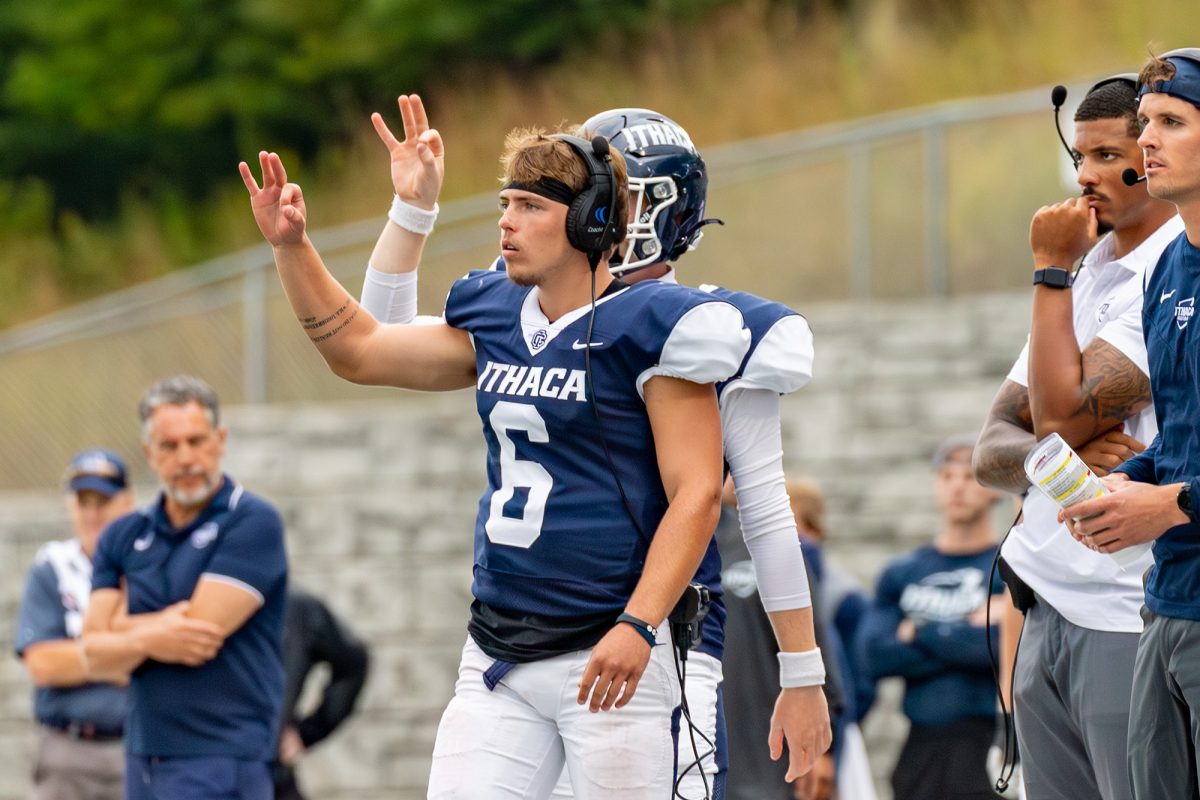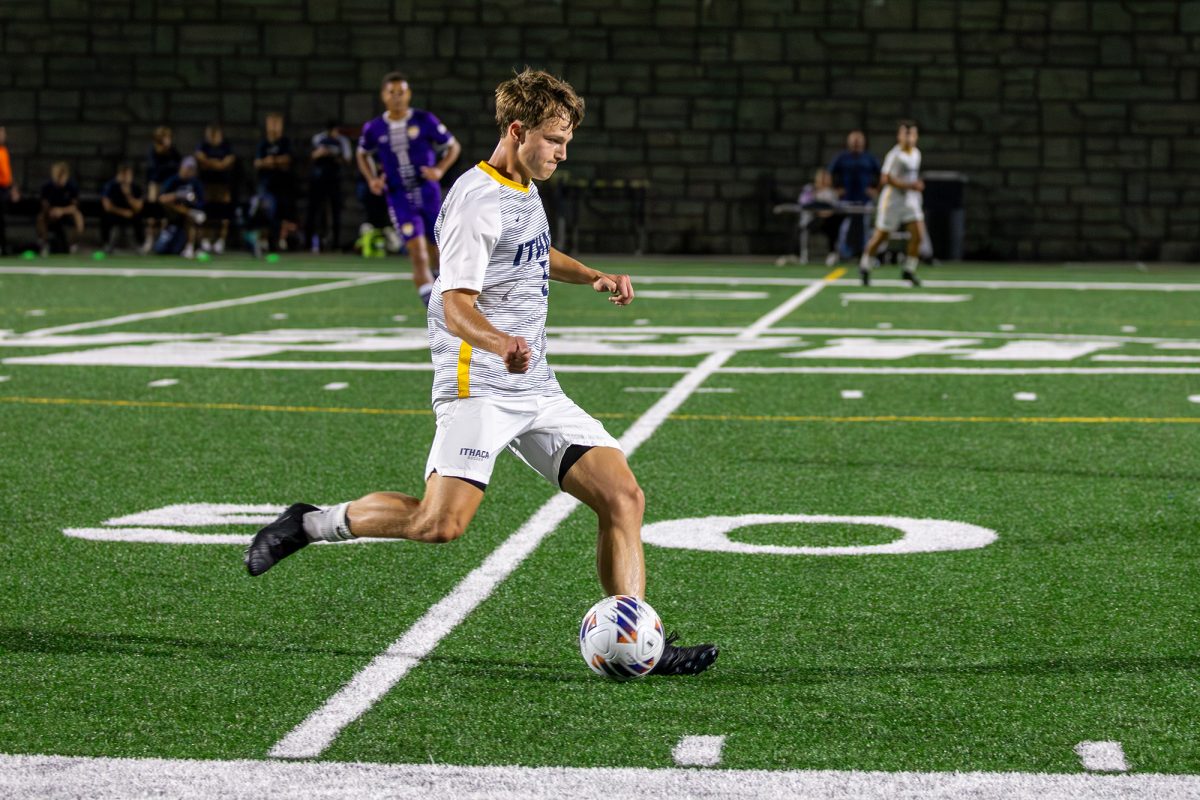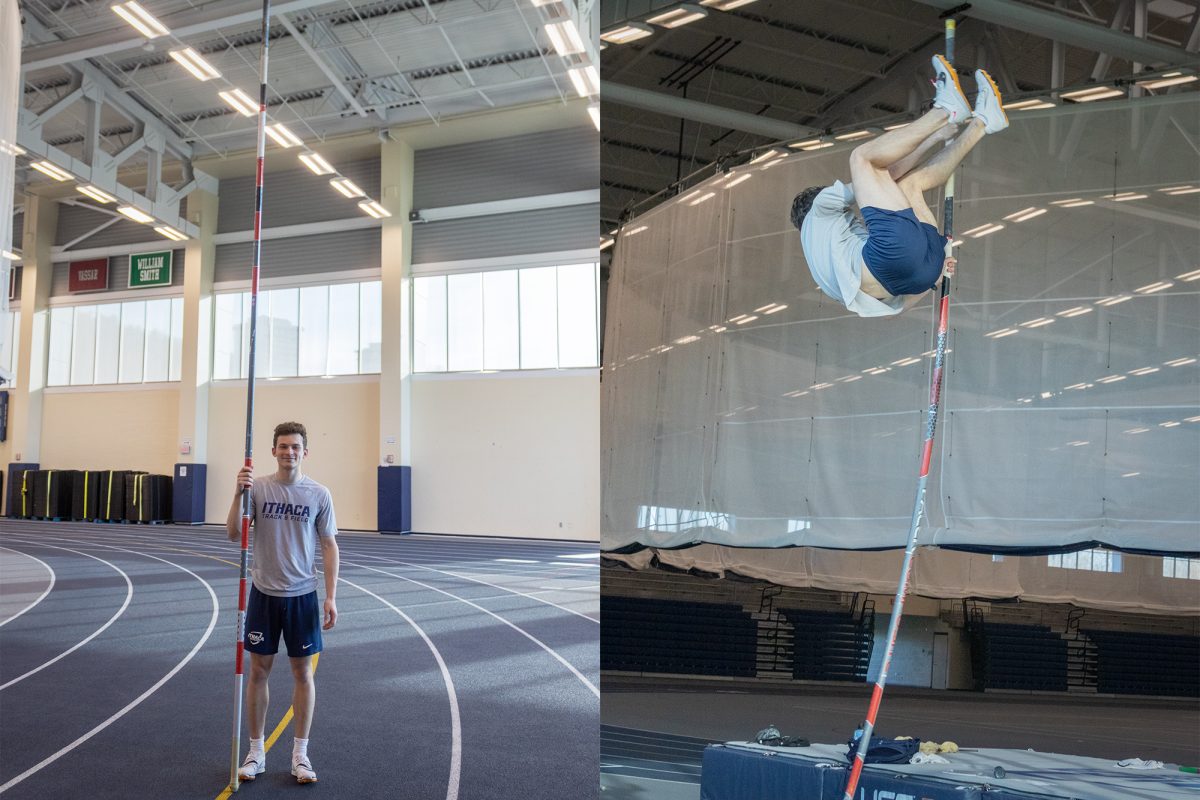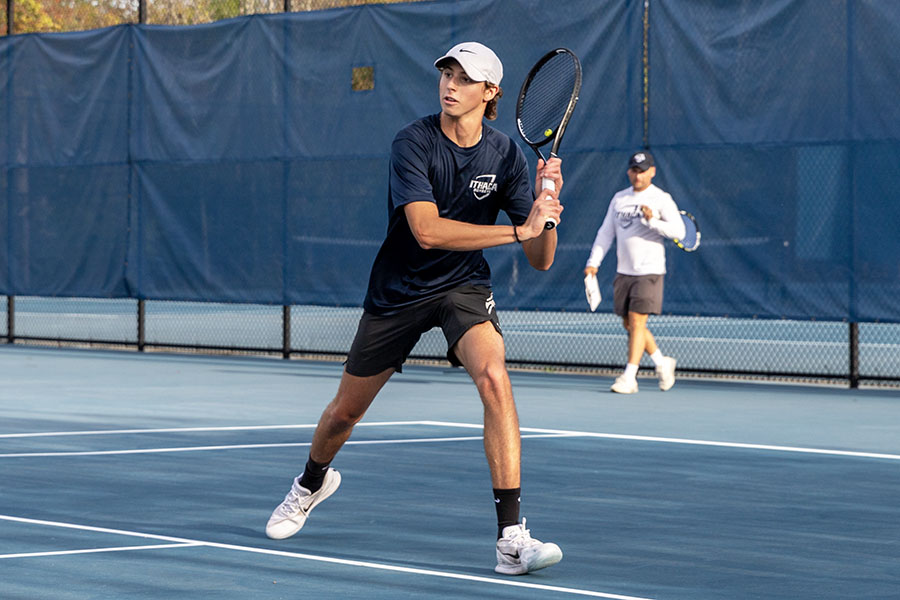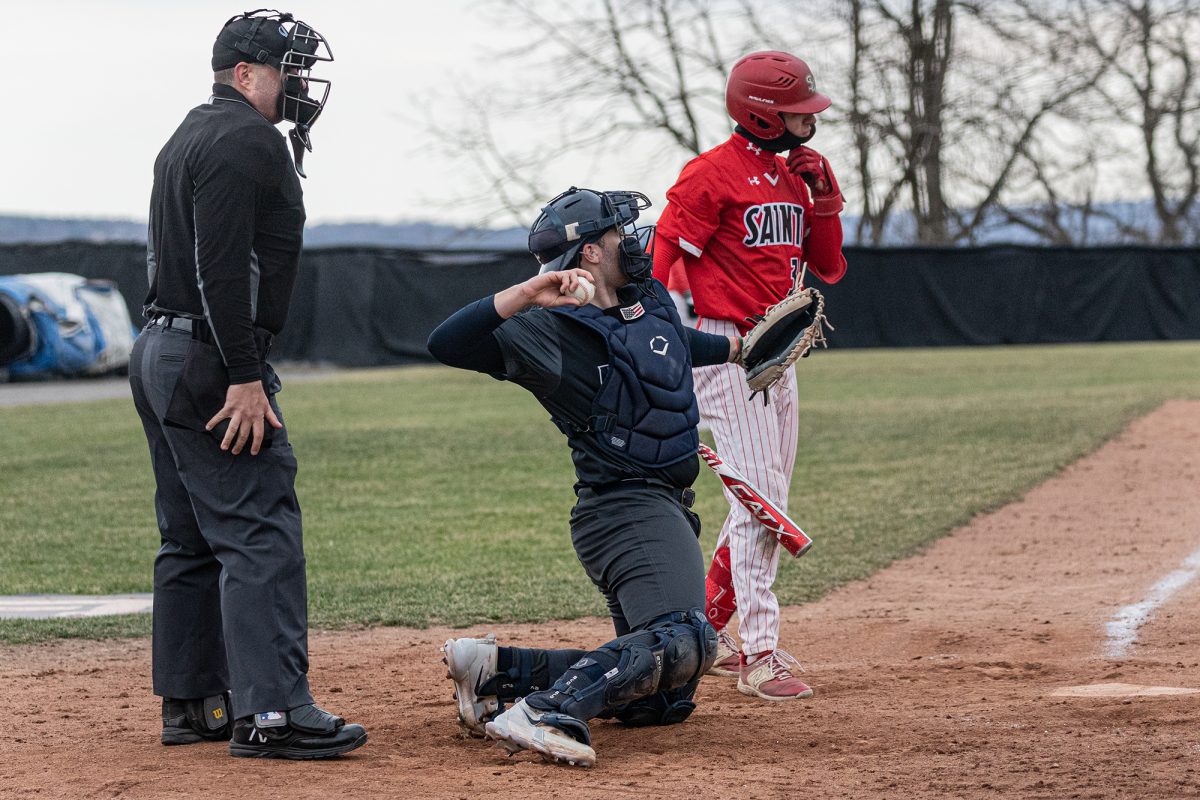It is about 20 minutes past the end of the Ithaca College football team’s practice Oct. 4 and there are only two players left on the field. Wide receivers sophomore Will Gladney and freshman Andrew Vito are working on their hands, throwing the ball to each other in uncomfortable positions. Gladney is lying on his back, then on his stomach, then sitting down with his legs straight in front of him. Vito is throwing the football at Gladney in each of the positions. Eventually, they get up and throw lob balls to each other, where the receiver has to look behind them and find the ball. This routine happens at the end of almost every practice.
The post-practice sessions seem to be working for Gladney, as he is leading the Liberty League in receiving yards, receptions and receiving touchdowns. Gladney’s spectacular start to the season may not come as a surprise to the Division I football coaches who sent him recruitment letters in high school, nor to his wide receivers coach Reece Petty, who called Gladney a “special” wide receiver. However, it might be a surprise to those who know that Gladney bounced around to over 25 foster and group homes during his childhood, before finally being adopted late in his sophomore year of high school.
Starting at the age of seven, Gladney began living in group homes in the Binghamton, New York, area. He bounced around quite a bit, which can be common in foster care, unable to land somewhere permanent. According to data from the Administration of Children and Families, at the federal Department of Health and Human Services, children have, on average, three different foster care placements.
In ninth grade, Gladney was moved to an independent living group home, which he said was not good for him. He said he would often not attend class due to the independence he was given.
“[It] gave me way too much freedom,” Gladney said.
Even though Gladney was having some athletic success as a freshman at Binghamton High School playing varsity football, academically, he said that he was struggling. He said that he would often skip class, which caused him to get in trouble at the group home.
“It was either go to a group home in Owego or go to a juvenile detention center and basically age out,” Gladney said. “Because that’s what New York State does to kids, they just don’t care about them, they throw them in there and they’re basically done for life.”
He chose the group home in Owego.
There Gladney met Marc Brainard, the assistant manager of the group home. Brainard said that when he first met Gladney during his intake, he knew he was different from other kids who had been in the system for as long as he had been.
“I say different because usually when we would get kids in similar situations, personality and character were much different,” Brainard said. “I could tell somebody did something right with Will along the way, he was a good kid, and you could tell that within 15 minutes of having a conversation with him.”
But it was not just Gladney’s demeanor that set him apart — it was his athletic ability.
Soon after the intake, Gladney, 15 at the time, and Brainard went outside to play basketball. Brainard said Gladney was able to move him around the court.
“I’m a large man, I’m 5’8”, muscular, 250–pound guy, and I’m out there playing basketball with him and he was able to move me around a little bit,” Brainard said. “He could play.”
Within two hours, Brainard had called his friend who was an Amateur Athletic Union basketball coach in the area, and Gladney had joined the team. Soon after, that coach would become Gladney’s foster father for about eight months. Brainard and Gladney would still spend time together by going out to eat, working out and spending time with Brainard’s son, Kingston.
The situation with the AAU coach stopped working out for both Gladney and the coach, causing Gladney to be moved into a group home in Elmira, a 35–minute drive from his school in Owego.
Brainard said he was devastated by Gladney being put back in a group home.
“I was heartbroken because working in the system so long I knew what was going to happen to Will,” Brainard said. “He’s a 6’3” black kid, who just had to leave another foster home. His fate was to age out in a group home and all the potential opportunities that he would have are gone.”
When he heard, Brainard said he was sitting in his room, visibly upset, when his fiance Jennifer Gates walked in.
“We sat there in silence for a minute and then she broke the silence by saying, ‘Why don’t we just take him?’” Brainard said.
Brainard said Gates made it clear that if anyone could help Gladney, it was Brainard. Brainard then called Gladney and asked him if he wanted to stay with them. Gladney immediately replied yes.
From there, Gladney’s athletic and academic careers took off. Brainard said Gladney’s junior year is when it all started to come together for him.
Brainard said he often gets the compliment that he ‘saved’ Gladney, but Brainard said he resents that acknowledgment.
“What I did was provide him a place and resources, and Will was hungry to be successful,” Brainard said.
In his junior year at Owego Free Academy, Gladney had almost 700 receiving yards and 7 touchdowns, netting him a third-team all–state honor. During his senior year, he led his team to the first round of the playoffs, and earned a first-team all–state honor.
Brainard and Gladney both said that Gladney was receiving scholarship consideration from Division I football programs; however, they were worried he would not academically qualify to play at the Division I level, mainly due to Gladney’s grades in ninth grade.
“All the coaches would talk to me and say ‘What’s your transcript ninth grade?’” Gladney said. “I’d show them and they’d just be like, ‘Bye.’”
When Gladney did finally qualify for the NCAA’s Clearinghouse standards, it was too late — weeks after signing day. Gladney ended up at Division III Ithaca College, and Brainard said that it has become the perfect place for him.
“I can’t think of a better place for him to be right now,” Brainard said. “Everything has worked out, coach Swanny coming in and, pretty much, his offense caters to Will and his skillset. He’s putting up huge numbers right now. Everything is falling into place for him. It’s a wonderful thing.”
Gladney’s success comes after a summer in Ithaca where he worked with other football players and recalls staying up until 2 a.m. some nights to run. Halfway through the season, that summer of work has paid off. Gladney has more than 140 receiving yards in three games, and at least one touchdown in five of the six games the team has played so far this season. Gladney said he knew going into this season that he would have more success because the game became easier for him.
“The game slowed down for me,” he said.
Petty, who has played and coached at three Division I programs, said Gladney stacks up against the best receivers he has coached.
“I’ve been telling people that we’ve got a special wide receiver that’s up there with the lot of the guys I’ve coached,” Petty said.
An exemplification of Gladney’s love for the game came on a fourth down quarterback punt near midfield at the end of the second quarter against Hobart. Freshman quarterback Wahid Nabi punted the ball and it bounced near the goal-line, Gladney sprinted from his position nearly 50 yards down the field to down the ball at the 1–yard line. Earlier in the day, Gladney protested during the national anthem by not placing his hand over his heart. Gladney told The Ithacan he didn’t want to talk about the protest for this article.
Brainard, Gates and their 9-year-old were all at the game that day, as they are for most home games.
Gladney has stayed close with his adopted family, especially Kingston. Brainard said Kingston and Gladney have a special bond.
“We don’t get to see Will often, but when we do, I still don’t see Will because he spends every second in this house with Kingston,” Brainard said.
Kingston, like his older brother, is a successful athlete scoring 33 goals in his first five youth soccer games. He also wears the number two, just like Gladney.
Gladney is only a sophomore, and Petty said that it is exciting Gladney has two more years.
“It’s something to look forward to,” Petty said. “Will would be the first person to say he’s got a lot to work on still.”


